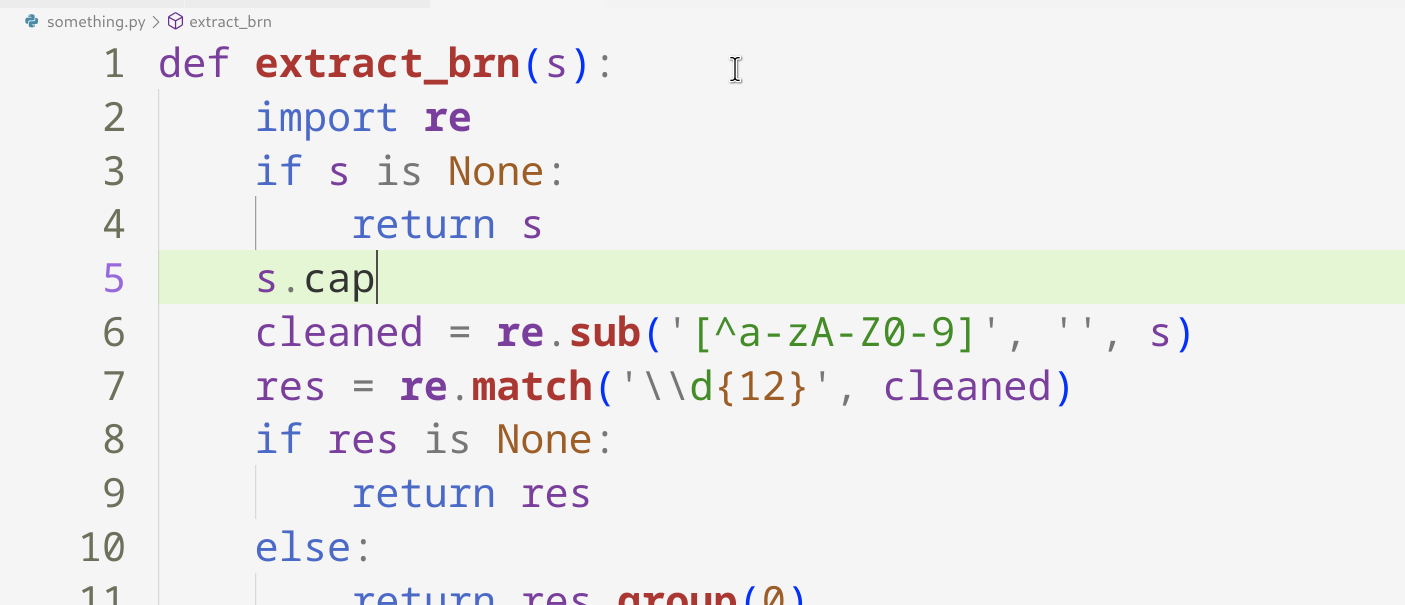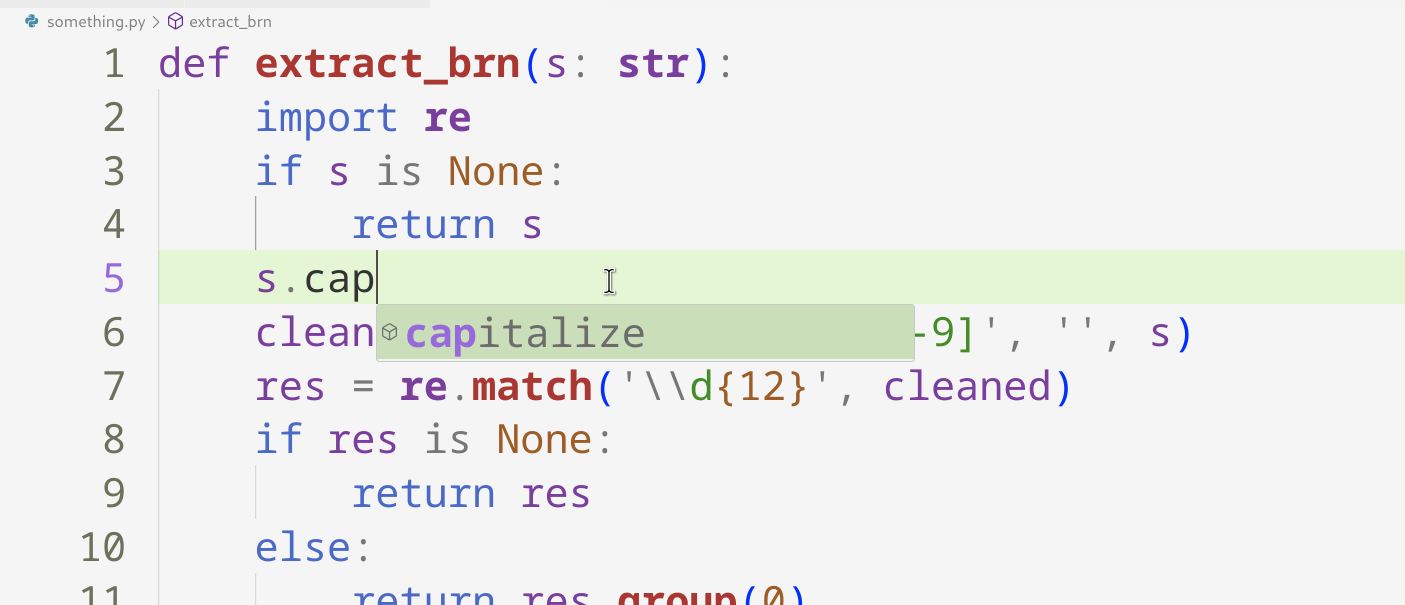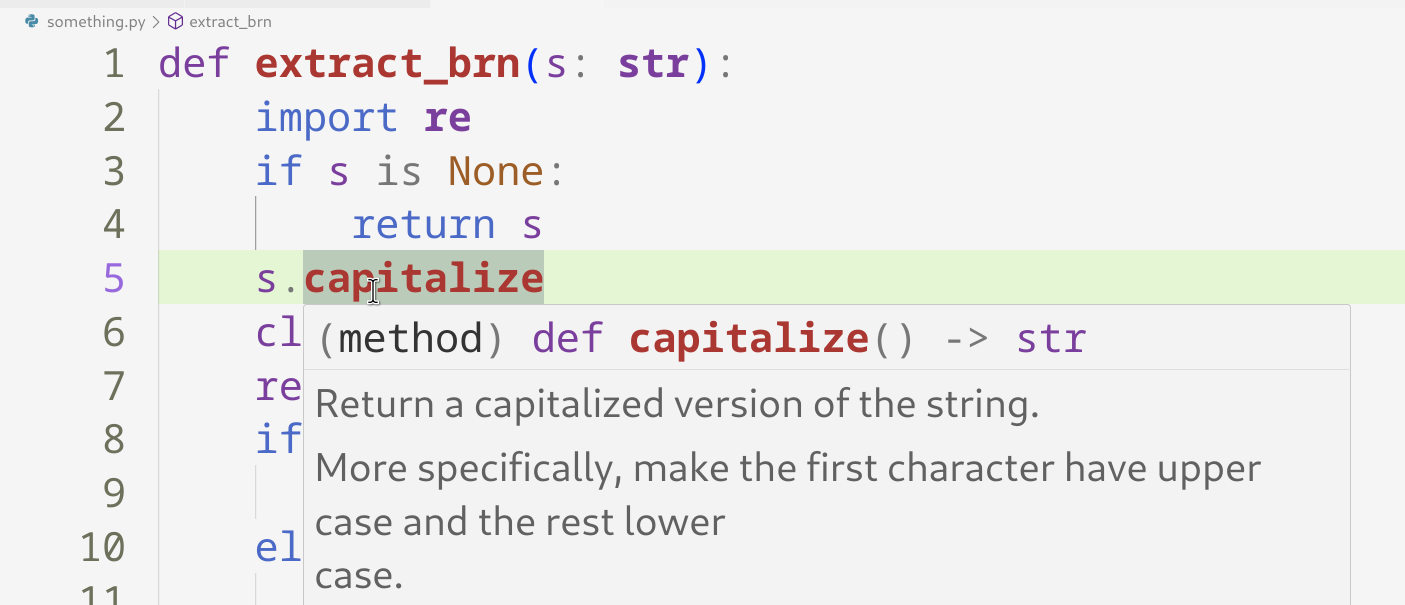date: 2024-10-30
类型应用入门零
前言
近来上司开始鼓励同事们用pydantic让ETL源码更加可靠。 不过,一般大学计课程不会教同学们类型论基础。 因此,我同事们不熟悉。 相关入门也比较匮乏,故此我写以下笔记。
前置
面向python的开发者,但只要求读者至少会一门编程语言。
使用类型系统的收益
以Python为例
类型标注可以现代IDE代码补全更加智能/type hints得以可能:比如依据对象类型自动列举相关办法,文档。
 没有标注
没有标注s形参类型
 标注
标注s形参类型后
 因
因s是string类型而string有capitalize的函数
所以vscode显示capitalize的文档
类型标注比注释是更好的文档,也是一种实现和调用双方的契约

图上为extract_brn的函数定义,其他开发者可以依据型参类型来合规地调用。
extract_brn(123)
extract_brn(None)
extract_brn(true)
如果如上调用,调用方可以默认以上程序是可以出错,
因为extract_brn函数假设形参s为string,
如果程序使用其他类型的数据传参,就已经破坏这个前提,
该函数的开发者可以因此不保证其正确运行。
如何推导类型?
注:作者使用”类型推理“特指type inference, 类型推导特指”type derivation“
1 : int
朗读出来
1是integer类型
以下是加法类型规则
e1 : int
e2 : int
---
e1 + e2 : int
朗读出来
如果两个相加的类型都是integer类型,那么结果的类型也是integer。
如果找不到对应的规则,就是类型错误。
例子一,
2 : int
3 : int
---
2 + 3 : int
例子二,
2 + 3 : int
5 : int
---
2 + 3 + 5 : int
例子三,
'2' : str
3 : int
---
'2' + 3 : error
知道类型是如何可以帮助你诊断问题
假设以下规则和前提是正确
print : ((str, float) -> None)
input : ((str) -> str)
# multiplication
f1 : float
f2 : float
---
f1 * f2 : float
# function call 1
a1 : t1
fn : ((t1) -> t2)
---
fn(a1) : t2
# function call 2
a1 : t1
a2 : t2
fn : ((t1,t2) -> t3)
---
fn(a1,a2) : t3
为什么以下python程序会报错?
print("Service Tax is:", input('enter a value:') * 0.06)
如果推导这程序的类型,
print("Service Tax is:", input('enter a value:') * 0.06)
| # use function call 2
| "Service Tax is:" : str
| input('enter a value:') * 0.06
| | # use multiplication
| | input('enter a value:')
| | | # function call 1
| | | input : ((str) -> str)
| | | 'enter a value:' : str
| | input('enter a value:') : str
| | 0.6 : float
| error # because float cannot multiply with str
转换input的返回值为浮点,程序就能跑。
前传:为什么编程语言会有数据类型
很多人都是在C语言入门课,第一次接触到类型
#include<stdio.h>
int max(int x, int y){
if(x < y){
return y;
}else{
return x;
}
}
int main(){
int x = 17;
int y = 13;
printf("max(%d, %d) => %d\n", x, y, max(x, y));
return 0;
}
类型一旦声明错误,什么类型错误的报错会让人摸不着头脑。
当时C语言设计时代背景,类型声明可以让编译器可以确定数据在内存如何读写。
C语言前身,B语言,初衷用来写操作系统,无类型,一切数据为字,字长为寄存器的大小。
当时PDP-11电脑可以以字节颗度地址来读取内存,而且一个字节刚好可以表示一个ASCII字符。一个16比特字长可以塞两个字符,可以更好利用内存资源。
由于文本处理需求,Dennis拓展B语言支持字节数据类型。他戏称称之为new B (吐槽:大佬就是不一样,非常牛逼)。
有些计算机的指令集架构下,浮点运算和整数运算使用各自一套不一样机器指令和寄存器,所以编译器也需要编译相应的指令。
通过以上个案,数据类型的引入是自然而然的。
拓展阅读
- Essentials of Programming Languages by Daniel P. Friedman and Mitchell Wand
- Types and Programming Languages by Benjamin C. Pierce
- The Little Typer by Daniel P. Friedman and David Thrane Christiansen
- https://www.manjusaka.blog/posts/2020/03/20/a-simple-history-about-type-hint-in-python/index.html